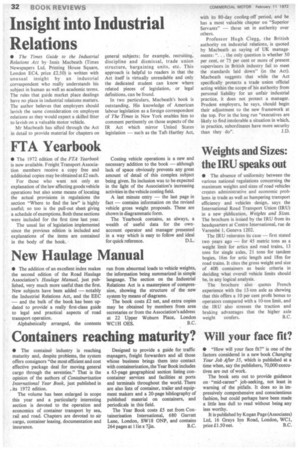Insight into Industrial Relations
Page 34

If you've noticed an error in this article please click here to report it so we can fix it.
• The Times Guide to the Industrial Relations .Act by Innis Macbeath (Times Newspapers Ltd, Printing House Square, London EC4, price £2.50) is written with unusual insight by an industrial correspondent who really understands his subject in human as well as academic terms. The rules that guide market place dealings have no place in industrial relations matters. The author believes that employers should lavish the same consideration on employee relations as they would expect a skilled fitter to lavish on a valuable motor vehicle.
Mr Macbeath has sifted through the Act in detail to provide material for chapters on general subjects; for example, recruiting, discipline and dismissal, trade union structure, bargaining units, etc. This approach is helpful to readers in that the Act itself is virtually unreadable and only the dedicated student can know where related pieces of legislation, or legal definitions, can be found.
In two particulars, Macbeath's book is outstanding. His knowledge of American labour legislation as a foreign correspondent of The Times in New York enables him to comment pertinently on those aspects of the IR Act which mirror United States legislation — such as the Taft-Hartley Act,
with its 80-day cooling-off period, and he has a most valuable chapter on "Superior Servants" — those set in authority over others.
Professor Hugh Clegg, the British authority on industrial relations, is quoted by Macbeath as saying of UK managements: ". . . the only question is whether 50 per cent, or 75 per cent or more of present supervisors in British industry fail to meet the standards laid down" (in the Act). Macbeath suggests that while the Act specifically protects a trade union official acting within the scope of his authority from personal liability for an unfair industrial practice, it does not protect a manager. Prudent employers, he says, should begin their adjustment to the new framework at the top. For in the long run "executives are likely to find intolerable a situation in which, in practice, subordinates have more security
than they do". J.D.








































































































